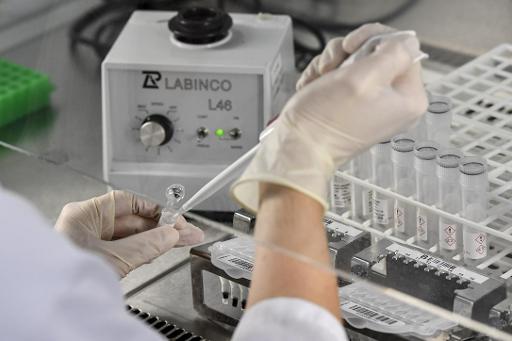As part of the way to help Belgian life return to normal after the crisis, a system of “Corona Containers,” designed by a Belgian company, aims to facilitate mass testing for the new coronavirus (Covid-19).
On Wednesday, the federal government announced that it would extend Belgium’s lockdown measures until 3 May, and added that “no one” knew when life would return to normal, as it would depend on the figures and on how well the measures continue to be respected.
Next week, the National Security Council will meet again, with the aim to organise the progressive and gradual relaxation of the measures, likely starting from the beginning of May.
During that transition phase of the gradual relaxation, the Corona Container system could be used. The system, designed by Belgian design agency Bump, is an open-source plan that can be used to test 300,000 people in 20 days and has been designed with the Belgian city of Antwerp in mind as a test-case. However, any city with large public spaces can reproduce the concept.
"We wanted to figure out a way to help get the economy back on track after the crisis, and we knew that mass testing will likely be needed as a phase of the return to normal," said Brett Kobie, the Strategy and Creative Director at Bump, to The Brussels Times.
However, relying on hospitals and doctors' offices for those tests would slow everything down, as they can only handle so many patients at the same time. Even with the increased capacity of test kits, reaching the same number of people would still take over a month.
Related News
- Coronavirus: Belgian researchers plan 'responsible deconfinement'
- More testing and better tracing key in phasing out lockdown
- Coronavirus: How to protect the most vulnerable in society
"Drive up testing is obviously not an option in most European cities either, for various reasons, such as crazy traffic jams. Not to mention that many people don't have cars," Kobie said. "So we designed a system that can use city squares to safely bring people together in a way that wouldn't feel overly apocalyptic," he said, adding that shipping containers are used as they are readily available across the world.
"Our goal is to kickstart a creative conversation on how to roll out mass testing in a safe, fast way that can serve as positive reawakening in cities, instead of the scary, sterile experience it would be if no one put any thought into it," Kobie said, adding that the containers could also be a starting point for cities in the global south dealing with extremely little resources.
The company is preparing to pilot the system together with two companies in the logistics sector, and is currently in discussions with an IT partner and two medical advisors from Antwerp academia to help refine the concept.
The shortage of test kits is one of the biggest obstacles, but the company’s goal is to ensure that a working system is in place so that cities or companies can move fast when more tests are made available.
This is the Corona Container. A low-cost open-source plan to test 300,000 people in 20 days using urban public spaces.
Full story: https://t.co/B2QnyXDLe5#COVID19 #coronavirus #design pic.twitter.com/UTDS13HJoL — Brett Kobie (@kobiebrett) April 9, 2020
As there will be pressure from the business community to test broadly and quickly in order to get the economic recovery in gear as soon as possible, Bump expects some form of testing by early May, even if details on the federal government’s official plan for larger-scale testing are still unclear.
In Brussels, for example, the containers could be placed in any city square with enough surface area, such as Sainte-Catherine, or the esplanade in front of the European Parliament.
"We now have considerable traction in Antwerp," said Kobie. "If we can get cities like Brussels, Ghent and Liège on board, we have a chance to incubate a system in Belgium that can be rolled out across other cities that much faster, instead of every city having to invent their own system from scratch," he added.
Maïthé Chini
The Brussels Times

